LithiumIon
Latest

'Semi-solid state' batteries could lead to cheaper, longer-range EVs
The race to create cheaper, longer-lasting batteries just got more interesting. 24M, a US Department of Energy-funded startup, announced that it has delivered semi-solid state lithium-ion batteries with energy density levels of 250 watt-hours per kilogram (Wh/kg). That roughly matches Tesla's 2170 cells used in the Model 3, considered to be the most efficient cells around. The company thinks it could do even better, making EVs longer lasting, lighter and cheaper.
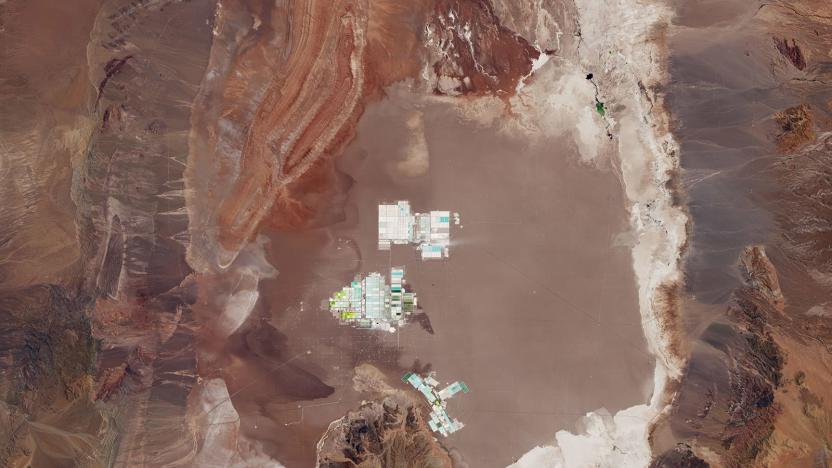
EV batteries are born in Chilean evaporation ponds
Using Landsat data from the US Geological survey, NASA's Laren Dauphin recently imaged the Salar de Atacama in Chile. The enclosed basin is the world's largest source of lithium, producing 29 percent of the world's reserves. Much of it will wind up in rechargeable batteries used by EVs, laptops and smartphones, but how it gets there is surprising -- think salt production, not pit mines.

A Chinese startup may have cracked solid-state batteries
Solid-state batteries have long been heralded as The Next Big Thing after lithium-ion, with companies from all quarters racing to get them into high-volume production. Dyson, BMW and car manufacturer Fisker are just a few names that have been working on the tech for the last few years, but now, reports suggest a Chinese start-up might be the first to have cracked it.

Researchers 3D print custom-sized lithium-ion batteries
One of the challenges in creating smaller and smaller devices these days, such as wearables and phones, is that the batteries can take up a lot of room. Cases are often designed around standard battery sizes, and it often creates wasted space. Now, new research published in ACS Applied Energy Materials shows that it's possible to 3D-print lithium-ion batteries into whatever shape you need.
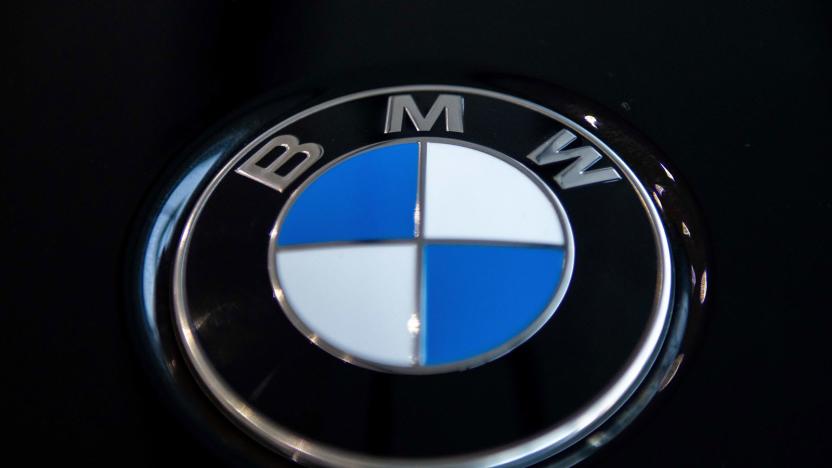
BMW will give EV batteries new life with recycling program
BMW is leading a consortium of companies with the goal of giving electric vehicle batteries new life after they've kicked the bucket as a car power source. The partnership with Belgian recycling firm Umicore and Swedish battery manufacturer Northvolt will repurpose EV battery cells, using them for energy storage before stripping them of raw materials that can be reused in other products.
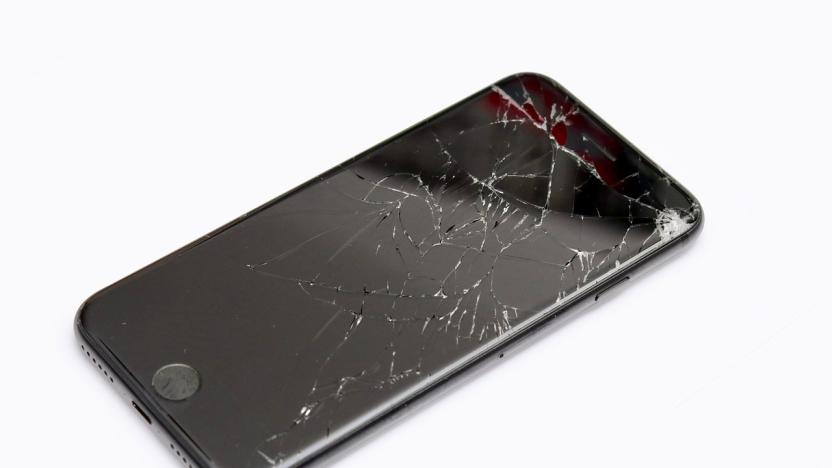
Researchers create safer lithium-ion batteries that harden on impact
Lithium-ion batteries have a world of important applications (smartphones, electric vehicles and the Mars Curiosity Rover, to name a few), but they're also notoriously unstable, and if damaged can result in burns, house fires and even plane crashes. Now, researchers think they've found a way to eliminate these dangers, by creating a lithium-ion battery that hardens on impact.

Bluesmart shuts down following smart luggage battery ban
Smart luggage maker Bluesmart is shutting down after concerns over batteries in checked luggage kept travelers from using its bags as intended. The company has sold its intellectual property and is ending refunds, sales and warranty support.

Energy storage breakthrough could boost EV range and slash charge time
Electric cars could soon have as much range as petrol and diesel cars -- and recharge in a matter of minutes -- thanks to what researchers are calling a "breakthrough" in energy storage technology. Teams from Bristol University and Surrey University have created a new material for supercapacitors, which store electric charge, that could see EVs recharge in as little as 10 minutes compared to the eight hours it can take for EVs with lithium-ion batteries. And according to the researchers, it boasts enough energy density to see EVs surpass even the top range of current leading models, such as Teslas. Elon Musk himself has previously said a breakthrough in EV technology would likely come from supercapacitors, rather than batteries.

Existing EV batteries could be recharged five times faster
Lithium-ion batteries have massively improved in the last half-decade, but there are still issues. The biggest, especially for EVs, is that charging takes too long to make them as useful as regular cars for highway driving. Researchers from the University of Warwick (WMG) have discovered that we may not need to be so patient, though. They developed a new type of sensor that measures internal battery temperatures and discovered that we can probably recharge them up to five times quicker without overheating problems.
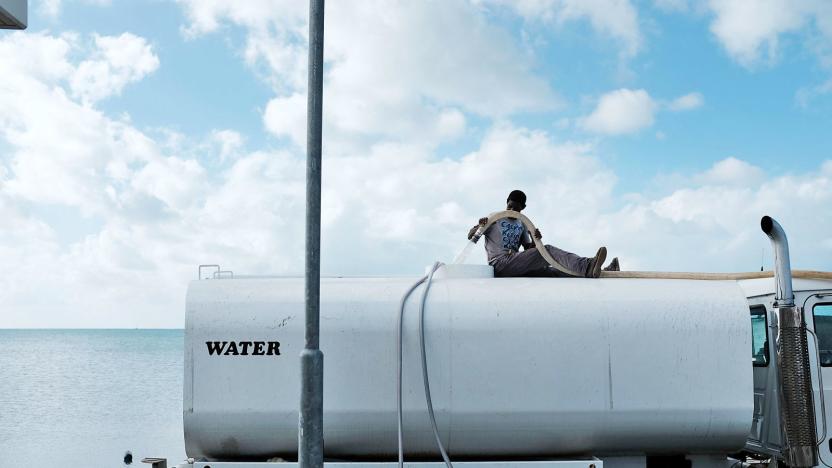
Water purification could be the key to more electric cars
Humanity is going to need a lot of lithium batteries if electric cars are going to take over, and that's a problem when there's only so much lithium available from conventional mines. There may be an oddball solution for that, however: turn the world's oceans into eco-friendly mines. Scientists have outlined a desalination technique that would use metal-organic frameworks (sponge-like structures with very high surface areas) with sub-nanometer pores to catch lithium ions while purifying ocean water. The approach mimics the tendency of cell membranes to selectively dehydrate and carry ions, leaving the lithium behind while producing water you can drink.
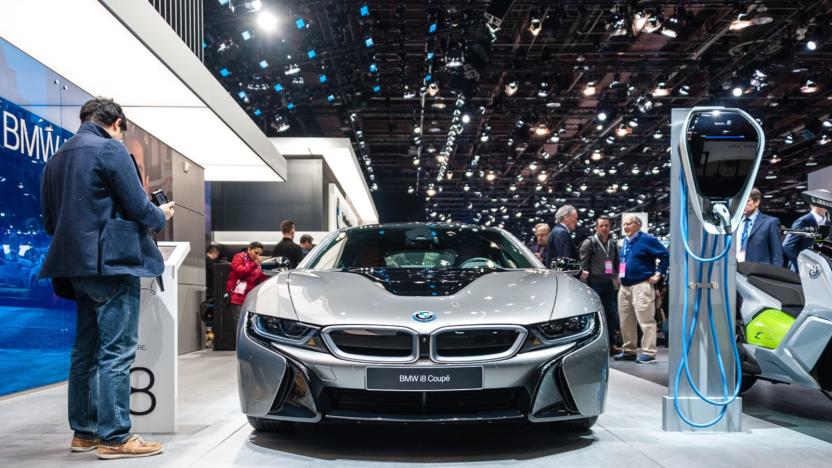
BMW's next generation of hybrids relies on modular electrification
BMW's alternative-fuel interests go beyond plug-in hybrids. Sure, the company has been building a battery-powered ecosystem, with cars like the city-styled i3 and i8 sports Coupe and Roadster serving as the testing grounds for tech that will later trickle down through the rest of the model line. But the company is also licensing its electrification technology to Karma's recently resurrected luxury EV sports car, the Revero, in addition to luxury boats from Torqeedo and yachts from Hinckley.
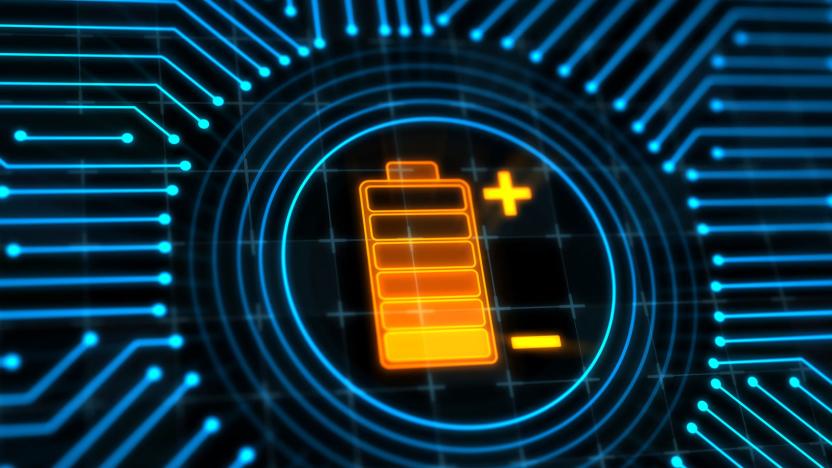
Magnesium batteries could be safer and more efficient than lithium
It's still early days for the promise of safer, energy-dense solid-state rechargeable batteries. However, a team of scientists at the Joint Center for Energy Storage Research have just discovered a fast magnesium-ion solid-state conductor that will go a long way towards making non-flammable batteries with more capacity.
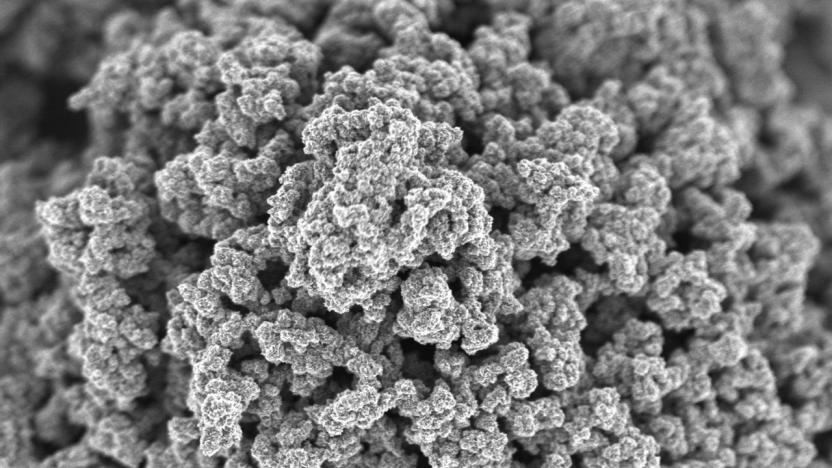
Samsung's 'graphene ball' battery could lead to fast-charging EVs
When it comes to lithium-ion batteries, you can have fast charging speeds or high capacities -- take your pick. Now, Samsung researchers, working with Seoul National University, have figured out how to give batteries both qualities thanks to our old friend, graphene. By coating the electrodes with a thin, popcorn-shaped layer known as a "graphene ball," they were able to produce a battery that could fully charge in just 12 minutes with up to 45 percent more capacity. The research, if it pans out, could lead to lighter and faster-charging electric vehicles.
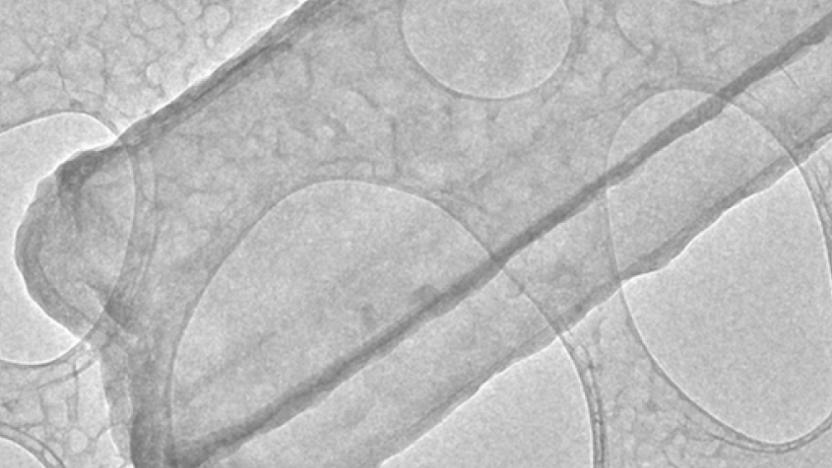
Researchers look deeply within batteries to see why they explode
High-energy batteries, like the ones in your laptop and smartphone, can fail, which can cause them to overheat and even catch fire. A team of researchers used cryo-electron microscopy (cryo-EM) , a technique that won the 2017 Nobel Prize in chemistry, to capture high-resolution, atomic-level images finger-like growths in these devices called dendrites. The new images will give scientists a better idea of what causes high-energy batteries to overheat, which could lead to safer devices for all of us.
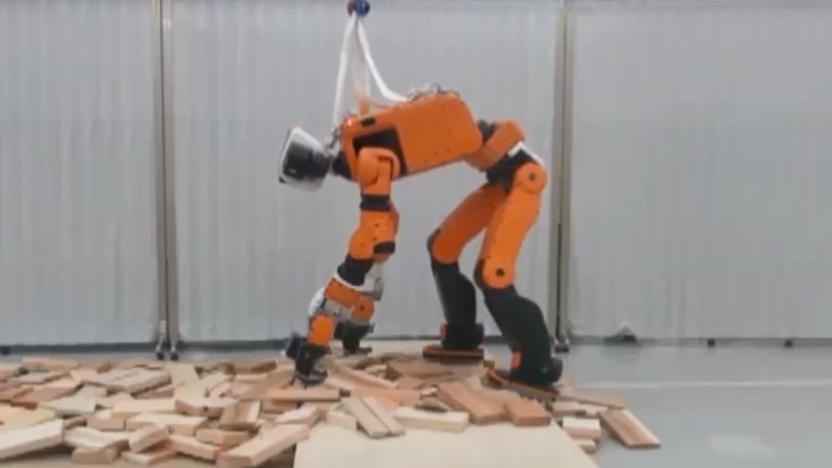
Honda's disaster recovery robot can climb ladders
The disaster response team of the future could be made up of an army of cheery orange robots, according to Honda. The company has unveiled a working prototype of its E2-DR disaster response robot -- first revealed in an R&D paper in 2015 -- and it can do a lot. At 1.68 meters high and weighing in at 85 kilograms, E2-DR can walk, step over objects, climb stairs and ladders, slink through narrow spaces and traverse piles of debris. It can even tolerate rain for 20 straight minutes, which is more than a lot of actual people can.

Mercedes-Benz aims to take hydrogen fuel-cells mainstream
General Motors' confidence in hydrogen fuel cell (HFC) vehicles seems to be sparking something of a renaissance among other automakers. In April, Toyota announced it was testing a HFC semi truck, and now Mercedes has announced a hybrid crossover utility vehicle that combines the pricey alternative-fuel tech with something a little less exotic: a battery-powered electric vehicle. The GLC F-Cell will carry 4.4 kilograms of hydrogen onboard, in addition to its 147 kilowatt lithium-ion battery. The automaker says that the the F-Cell's range can hit 437 kilometers (roughly 271 miles) with a governed top speed of 99 MPH, and that it'll charge in about 1.5 hours.

Water-based electrolytes promise safer phone batteries
It's hard to completely escape safety issues with lithium-ion batteries, in part due to the nature of the electrolytes that charge and release energy when ions shuttle between electrodes. They usually have to be made of easily combustible chemicals to muster enough power. However, that might not be a problem for much longer. Scientists have crafted a water-based electrolyte that's both considerably safer and manages enough voltage (4V) to be useful.
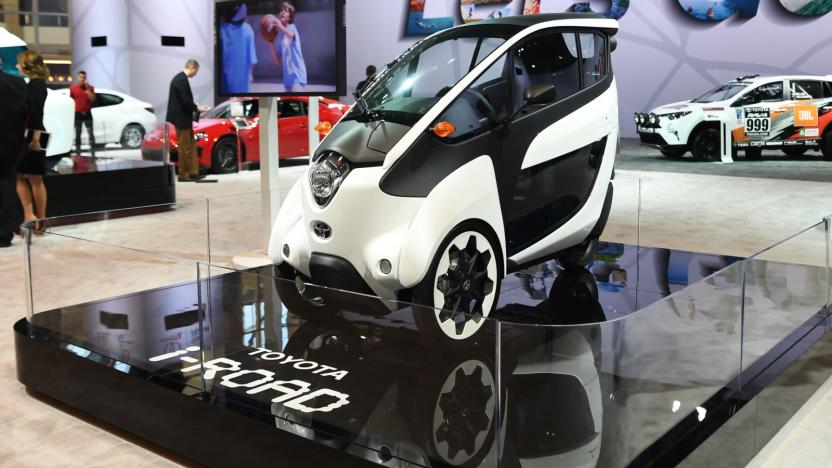
Toyota’s future EV battery tech could enable much longer trips
The switchover to an electric vehicle (EV) future is bound to happen, with increased sales and companies like Volvo committing to hybrid models in the next couple of years. One of the things still holding back widespread adoption of the technology, however, is the low range the current crop of EV batteries represent. We're not going to put all of our hopes into cars that can only travel so far, especially as the infrastructure to recharge such vehicles is thin on the ground. Toyota is looking to change that, however, with a new solid electrolyte battery technology that would make for smaller, lighter lithium-ion batteries, which could then combine into higher-range charges for electric cars. Toyota told The Wall Street Journal that the batteries are in "production engineering" now, and that we might be able to buy cars with the new batteries by the early 2020s.

Tesla is building world’s largest backup battery in Australia
After blackouts left 1.7 million residents without electricity, Elon Musk famously guaranteed that Tesla could supply 100 megawatts of battery storage in 100 days. The company has announced it will do just that by installing a Powerpack battery storage system that can run over 30,000 homes. The 100-megawatt project "will be the highest power battery system in the world by a factor of three," tweeted CEO Elon Musk. It will back up the 315 megawatt Hornsdale Wind Farm, charging during low energy usage and providing electricity for peak hours.

Smoking Boosted Boards recalled over battery issues
Last November, the folks behind the Boosted electric skateboard urged its customers to stop using their second-gen boards following battery "venting" until an internal investigation was complete. It turns out that those problems were the result of a short-circuit caused by water entering the battery -- not from issues with the power packs themselves. As a precaution, the company has reported the issue to the US Consumer Product Safety Commission, is starting a voluntary recall of the standard range battery packs and will no longer market the board as water resistant.







